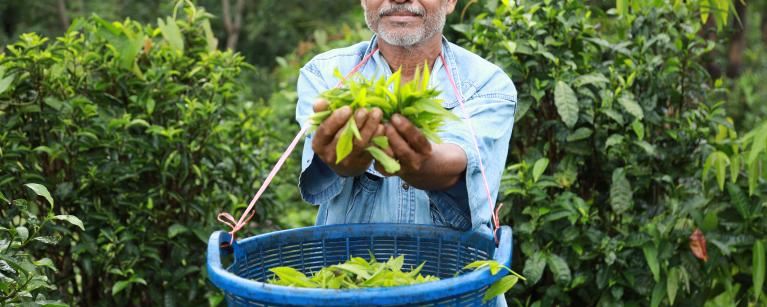SOLAR Project: Sengthong Manixap, Lao tea farmers boost sales and protect the environment by forming a cooperative

Sengthong Manixap, Lao tea farmers boost sales and protect the environment by forming a cooperative
Cultivated in the cool, hospitable climate of the Bolaven Plateau, Paksong tea is renowned for its unique aroma and taste. It is little surprise then that the tea industry has a rich history in this region of the Lao People’s Democratic Republic dating back more than a century, when Paksong tea started gaining recognition alongside the region’s already famous coffee. However, despite this legacy of excellence, tea farmers in and around the town of Paksong have never had it easy. Traditionally, most households have operated as informal businesses with limited market access, working long hours under difficult conditions and generally without access to social protection. But things have started to change.
In 2020, a group of Paksong farmers, with help from international organizations, established the Paksong Tea Promotion Association to support more than 100 families involved in tea cultivation in Paksong District. And in 2023, the Government took steps to reduce imports of non-essential products, particularly coffee and tea, which should give Paksong tea farmers improved access to local markets and allow them to sell their tea at a better price. Now thanks to support from the SOLAR Project – a European Union funded initiative implemented by the ILO and Oxfam – the Paksong tea farmer’s association has evolved a step further through its recent transition into a cooperative.
Formed in November 2023, the Paksong Tea Cooperative brings together 87 families in seven villages to focus on producing high quality organic teas that meet local and international market demand. This is achieved by cooperative members all adhering to the Lao Department of Agriculture’s 25 standard farming practices, which cover everything from soil preparation all the way through to harvesting, and by prioritizing organic farming practices that ensure an excellent product while also protecting the local environment. Sengthong Manixap, Head of the Paksong Tea Cooperative, underscored the importance of organic production methods and environmental sustainability, but also noted that there is much more to making a great tea than maintaining a plantation of healthy and robust tea plants. “Processing good quality tea involves several key steps to ensure the flavour, aroma and overall quality of the tea leaves are preserved,” he noted as he strolled through the small work area at the rear of his farm. “Some of the key points of making good quality tea include harvesting, withering, rolling, oxidation, drying, firing, sorting, and also packaging.”
With so many steps involved in creating the black, red, white and green teas produced by the cooperative, members undergo extensive training on tea processing techniques across the entire production pipeline. All new members undergo a 20-month evaluation period to ensure their products meet the cooperative’s standards before becoming certified organic producers.
By coming together as a collective – and previously as an association – the tea farmers of Paksong have been able to create a united effort to market and promote their teas, and thereby overcome previous awareness challenges to drive ever growing sales.
“Some years ago, almost no Lao people drank Lao tea,” Sengthong recalled, “but today many restaurants and hotels in the country buy tea from us, and I believe that in the future we may not be able to produce enough, especially in the dry season, because the number of orders is steadily increasing.”
With annual production exceeding 20 tonnes, the cooperative sells its tea at competitive prices in both local and international markets. Now they are looking to capitalize on this success by seeking additional funding to enhance production capacity and quality through technology upgrades, better processing equipment, and greenhouse facilities for the rainy season. Already through support from the ILO, the cooperative has received essential equipment such as solar-powered lights, drying racks, tea leaf rolling machines and protective gear. This support has not only boosted productivity, but has also helped to ensure the safety and well-being of farmers during their work. “Security and safety are very important for farmers because a family usually has only two workers. If there is an accident, it means they lose some of their income,” Sengthong recounted. He added that in the past, many farmers did not pay enough attention to safety or wear any gear to protect themselves, so injuries were commonplace. Now, under the SOLAR Project, almost every month the farmers participate in a training session on occupational safety and health, as well as related areas like social security, gender equality, disability and social inclusion. With things looking increasingly positive for the cooperative, Sengthong is now starting to look beyond the immediate needs of members to the more distant future of the Paksong tea industry. “I believe that the best investment is to invest in young people,” he said. “I hope that if local young people become more interested in this business, then Lao tea and coffee will become famous worldwide.”